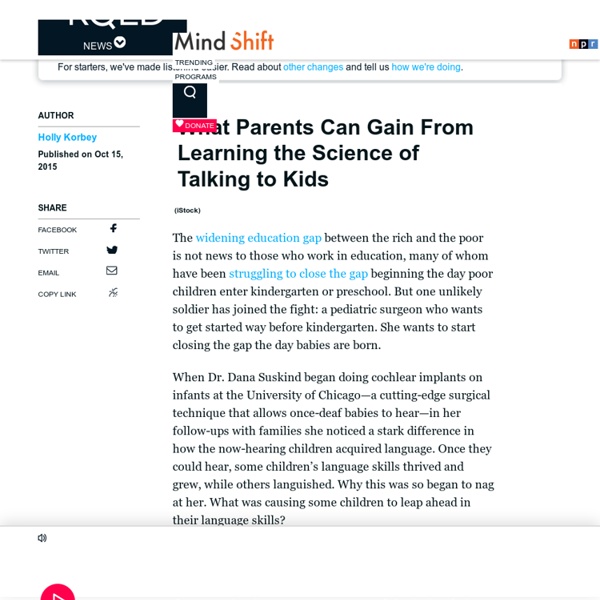How young children learn English as another language
By Opal Dunn, educational consultant and author Introduction Young children are natural language acquirers; they are self-motivated to pick up language without conscious learning, unlike adolescents and adults. They have the ability to imitate pronunciation and work out the rules for themselves. Any idea that learning to talk in English is difficult does not occur to them unless it’s suggested by adults, who themselves probably learned English academically at a later age through grammar-based text books. Read the notes below about young children learning English as another language.
Multilingual Preschoolers
It’s amazing how young children learn to converse with others. They have to not only internalize grammar and vocabulary, but also develop an understanding of culture: how to take turns in a conversation, who to talk to, and how to narrate a story. For dual language learners (DLLs) — children under the age of 5 with a home language other than English — that process can be complex.
Heuristic play
Heuristic play is rooted in young children’s natural curiosity. As babies grow, they move beyond being content to simply feel and ponder objects, to wanting to find out what can be done with them. Toddlers have an urge to handle things: to gather, fill, dump, stack, knock down, select and manipulate in other ways. Household or kitchen utensils offer this kind of activity as every parent knows, and can occupy a child for surprising stretches of time. When toddlers make an enjoyable discovery – for instance when one item fits into another, or an interesting sound is produced – they often repeat the action several times to test the result, which strengthens cognitive development as well as fine muscle control and hand/eye coordination. In their book, People under Three, Elinor Goldschmied and Sonia Jackson coined the term heuristic play, to explain how to provide a more structured opportunity for this kind of activity.
Why Movement is Essential in Early Childhood
With so few years under their belts, my 3- and 6-year-old daughters are still learning to inhabit their bodies. They are learning how to maneuver themselves physically, how to orient themselves in space. As Vanessa Durand, a pediatrician at St. Christopher’s Hospital for Children in Philadelphia, says, freedom of movement is necessary for children to meet their developmental milestones: “Children learn by experiencing their world using all of their senses. The restriction of movement, especially at a young age, impedes the experiential learning process.” Movement allows children to connect concepts to action and to learn through trial and error.
kolb
(Video by Alice Y. Kolb.) David A.
How can I help my child to start talking? (Video)
Health visitor Sara Patience describes how you can help develop your child's language skills by talking and playing with her. Show transcript Hide transcript How can I help my child to start talking? Sara: “You want this one? Between 12 months and two-and-a-half years, there is a lot of language development, and you will hear your child start to use more and more words.
Primary school shake-up to focus on ‘play-led’ learning
Children at primary schools would not study traditional subjects until as late as 10 years of age, under proposals being considered by policymakers. Instead, there would be a much greater emphasis on creative play during the early years of primary school, and broader areas of learning in later years. The reforms are based loosely on some of the features of top-performing education systems in countries such as Finland, as well as new research on how children learn. The proposals, drafted by the National Council for Curriculum and Assessment (NCCA), represent some of the biggest proposed changes to teaching and learning at primary level in more than two decades. They also seek to give teachers more flexibility and autonomy over the amount of time dedicated to key areas of learning. Educators, policymakers and parents discussed the proposals at a conference in Dublin Castle on Tuesday as part of a consultation phase which continues until the end of April.
FAQ: Raising Bilingual Children
Why want bilingual children? There are many reasons, but the two most common are: 1) The parents speak different languages (say, an American woman and a Turkish man). 2) The parents speak the same language, but live in a community where most people speak something else (say, a Korean couple living in the USA). In the first case, both the mother and father may want to be able to use their own language when talking to their children.
Convention on the Rights of the Child
Arabic | Chinese | French | Russian | Spanish Text in PDF Format Adopted and opened for signature, ratification and accession by General Assembly resolution 44/25 of 20 November 1989 entry into force 2 September 1990, in accordance with article 49 Preamble The States Parties to the present Convention, Considering that, in accordance with the principles proclaimed in the Charter of the United Nations, recognition of the inherent dignity and of the equal and inalienable rights of all members of the human family is the foundation of freedom, justice and peace in the world,
Why does my toddler love repetition?
Paediatric speech and language therapist It may test your patience when your toddler demands 'Row, row, row your boat' for the 10th time. But there's a good reason for her insistence.
The cognitive benefits of play: Effects on the learning brain
© 2008 - 2014, Gwen Dewar, Ph.D., all rights reserved Science supports many of our intuitions about the benefits of play. Playful behavior appears to have positive effects on the brain and on a child’s ability to learn. In fact, play may function as an important, if not crucial, mode for learning. Want specifics? Here are some examples.



